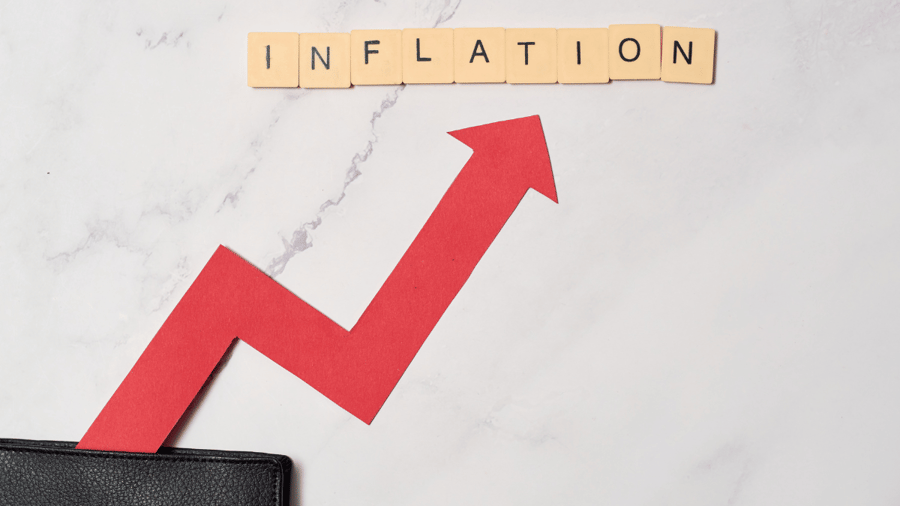Jack Matasosky, founder of APPRO Development and owner and broker of CERRON Commercial Properties, and Roz Peterson, CERRON agent, recently attended a presentation by real estate economist Dr. Mark Dotzour. Jack, Roz and Bruce Rydeen, CERRON owner and agent have all followed Dr. Dotzour for more than 20 years, and in that time they have appreciated his economic insights and found that he offers fairly accurate predictions for the economy.
The following are highlights from Dr. Dotzour’s presentation that Jack and Bruce felt would be helpful to our clients as they navigate the ups and downs of the real estate market. Read on for insights into the strength of the US economy, the policies that affect it, and the outlook for inflation over the coming years.
Policies Impacting the Economy

In Dr. Dotzour’s opinion, a number of policy decisions over the past 15 years have significantly impacted the economy as we see it today.
For example, he believes the Fed kept mortgage rates at 2.75% for far too long. Dr. Dotzour also notes the impact of the Dodd-Frank Act, which he believes has increased housing shortages nationwide.
Combined with conflicts at home (such as the 2020 protests) and shifting allegiances abroad (China aligning itself more firmly with Russia, North Korea, and Cuba), as well as big government spending during the COVID crisis and immigration policy fallout (he believes current policies will bankrupt many cities), these policies and events—among others—have built the economy we see today. And they’ll continue to have an economic impact moving forward.
Please note: These are Dr. Dotzour’s opinions. In addition, he clarifies that as an economist, his chances of being correct are around 50%. He also feels it’s important to share that he “thinks minivans are cool.” 😄
How Strong Is the US Economy Right Now?

Economic forecasting is tricky, and not always accurate. Case in point: recession has been forecast every year since 2022 by experts across the board, from Bank of America to Deloitte to Forbes and more.
And as of yet, none of them have been right. But as Alan Greenspan noted in his 1999 speech to the IMF, “The fact that our econometric models at the Fed, the best in the world, have been wrong for fourteen straight quarters does not mean that they will not be right in the fifteenth quarter.” In other words, just because a recession hasn’t hit yet, doesn’t mean it won’t.
That said, Dr. Dotzour believes a recession is unlikely in 2024. Among other factors, he noted that:
- FICO credit scores have reached historic highs
- Consumers have a lot of debt capacity left
- Consumers still have significant money in checking, savings, and money market accounts
- Corporate profits are still high
- Stock prices are still high
In addition, he notes that real estate values increased by $14.7 trillion from 2020-2023 (Source: Federal Reserve Bank of St. Louis). Even if they were to drop by as much as $15 trillion, we’d simply be back to 2020 levels.
So at the moment, it looks like we’ll avoid a recession in the immediate future.
What Is the Outlook for Inflation?

Since September 2022, a few Consumer Price Index (CPI) categories have decreased (such as the cost of used automobiles), but the majority have increased. Rents of primary residence and owners’ equivalent rents, for example, have increased by 7.4% and 7.1% respectively.
In addition, the federal spending deficit has increased significantly over the past 20 years. Federal outlays for interest are also spiking, as 0% treasury bills are refinanced at 5.5%.
Dr. Dotzour says, “This will impact state and municipal budgets as well, as they refinance their bonds each year. There will be talk of tax increases in the US coming soon, as well as of austerity budgets and sequestration. If not, then the 10-year Treasury rate could start going up even with the Fed doing quantitative easing.”
Dr. Dotzour believes that reported inflation will be lower for the next two years as the housing component of the CPI drops due to significant new supply in multi-family housing.
Meanwhile, he expects to see wages “continue to increase for the next three to five years, putting continuous upward pressure on inflation. The next inflation impulse will come in 2025 and 2026, when apartment rents begin to increase at a higher rate due to a dearth of new starts and completions.”
At APPRO Development and CERRON Commercial Properties, we bring you these economic insights to help inform your real estate decisions. If you’re considering a commercial real estate purchase or sale in the near future, we’d love to assist you. Contact us today to discuss your goals and learn how our team can help you reach them.